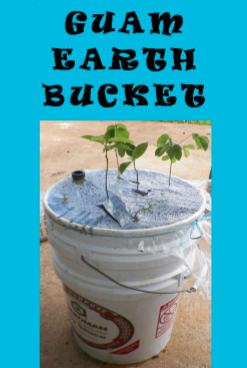Guam Earth Buckets: Sub-irrigated Planters

Guam Earth Buckets: Sub-irrigated Planters
- Status: Past Project
- Possible Hours: 10
- Categories: Education and Literacy, Citizenship and Civic Engagement, Environment and Sustainability
- Schools: Open to All Schools
- Project Start Date: 08/27/2018
- Project End Date: 03/31/2024
Contact us to sign up.
Take volunteer tour & safety briefing at Island Girl Power.
Dress for gardening work.
Show up at Island Girl Power at your scheduled time.
You can help make Earth Buckets to give away. If you would like to take one home, then you need to pay a $10 fee.
Follow directions to make the Earth Bucket.
Donate it to your designated recipient.
Take pictures of making the Earth Bucket and donating it. Post on social media using hashtag, #guamservicelearning, #guamearthbucket
In order to earn service learning hours, a reflection needs to be turned into a teacher who can input the hours into Power School. You need to address: What did you do? What did you learn? How was this an example of public service? How did you feel when you donated your Earth Bucket to someone who needed it?
Learn to follow design instructions with measurements, to use power tools and equipment, to make an earth bucket and give it to a person in need with a food plant and soil included.
To become aware of the need to conserve our water and soil resources.
To learn of a wonderful use of recycled products.
Standard 1: Science As Inquiry: Students use scientific inquiry and develop the ability to think and act in ways associated with inquiry.
BI.1.4 Communicate the components and results of life science explorations using appropriate techniques.
BI.1.5 Be curious, honest, open, and skeptical and value these attributes in others while engaged in life science activities.
BI.1.6 Demonstrate by actions in the school community caring and respect for the environment and living organisms.
Standard 2: Life Science: Students understand the diversity and unity of living organisms, the living environment, and principles of ecology.
BI.2.22 Understand and describe how organisms are influenced by a particular combination of living and nonliving components of the environment.
Acknowledged by Teacher/Guidance Counselor:
Print name: _____________________________
Signature:_______________________________
Date:______________________









